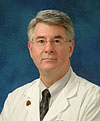
Strieter, Robert M.
Primary Appointment
Professor, Medicine
Contact Information
PO Box 800466
Telephone: 982-6999
Email: rms4w@virginia.edu
Research Interests
Cytokine and Chemokine Biology As Related to Human Diseases
Research Description
Our laboratory is interested in cytokine and chemokine biology as it relates to a variety of human diseases. We are currently investigating the role of a variety of cytokines (i.e., early response, Th1, and Th2) and CXC, CC, C, and CX 3C chemokines in mediating inflammatory and immunologically mediated disease processes. Our laboratory is interested in the mechanisms of how CXC chemokines modulate angiogenesis and metastases of cancer; and promotes vascular remodeling in fibroproliferative disorders. Our laboratory was the first to discover that the CXC chemokine family can behave as either promoters or inhibitors of angiogenesis. We have determined that on a structural/functional basis the domain of three amino acids (Glu-Leu-Arg; ELR motif) that immediately precedes the first cysteine amino acid residue of the primary structure of these cytokines, dictates their function in regulating angiogenesis. Members of the CXC chemokine family that contain the ELR motif (ELR+) are angiogenic, whereas members that lack the ELR motif (ELR-) and are induced by interferons inhibit the angiogenic activity induced by either ELR+ CXC chemokines, bFGF, or VEGF. Furthermore, others and we have determined that specific chemokine receptors are involved in this disparate angiogenic activity. Our laboratory is interested in mesenchymal progenitor cell trafficking during inflammation and resolution of injury. We are one of the first groups to show that these cells can contribute to the fibroproliferative phase of lung injury. We are expanding these findings to include understanding mechanisms of mesenchymal stem cell plasticity that may be relevant for pathogenesis of obesity. We have found that a circulating progenitor epithelial cell is necessary for repair of injury related to the airway or lung parenchyma epithelium. Our laboratory is interested in the role of cytokines/chemokines in mediating acute and chronic lung allograft rejection. We are one of the few laboratories in the country that has operative an orthotopic single lung transplantation model in rat. Our laboratory uses a variety of strategies that include molecular, cellular, animal models, and human tissue specimens to examine the biology of chemokines in the regulation of innate and adaptive immunity, angiogenesis, and progenitor cell trafficking in a variety of model systems relevant to human disease.
